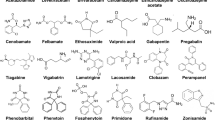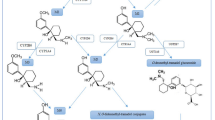Abstract
Purpose
Pregabalin is a novel GABA-analogue approved for the treatment of partial onset seizures, neuropathic pain, and general anxiety disorder. Pregabalin has been classified as a Schedule V drug with a low risk of inflicting abuse or addiction. However, some publications have indicated that pregabalin may have a potential for abuse among patients with past or current opiate addiction. Thus, we hypothesized that pregabalin might be abused by patients who were undergoing an opiate replacement therapy and never had an indication for taking pregabalin on medical grounds.
Methods
Urine specimens from 124 patients with opiate dependency syndrome and from 111 patients with other addiction disorders (alcohol, benzodiazepines, cannabis, amphetamines) were screened for pregabalin by means of a mass spectrometer analysis.
Results
We found 12.1 % of all urine specimens from patients with opiate addiction to be positive for pregabalin. None of the patients concerned had a medical indication for using pregabalin. In the control group, 2.7 % of the patients were tested positively for pregabalin, due to their taking it regularly for chronic pain or general anxiety.
Conclusions
Our data suggest that pregabalin is liable to be abused among individuals with opiate dependency syndrome Thus, vigilance and caution are called for when patients with a past or current opiate dependency are exposed to treatment with pregabalin.
Similar content being viewed by others
References
Tassone DM, Boyce E, Guyer J, Nuzum D (2007) Pregabalin: a novel gamma-aminobutyric acid analogue in the treatment of neuropathic pain, partial-onset seizures, and anxiety disorders. Clin Ther 29(1):26–48. doi:10.1016/j.clinthera.2007.01.013
Bandelow B, Wedekind D, Leon T (2007) Pregabalin for the treatment of generalized anxiety disorder: a novel pharmacologic intervention. Expert Rev Neurother 7(7):769–781. doi:10.1586/14737175.7.7.769
Boomershine CS (2010) Pregabalin for the management of fibromyalgia syndrome. J Pain Res 3:81–88
Brodie MJ (2004) Pregabalin as adjunctive therapy for partial seizures. Epilepsia 45(Suppl 6):19–27. doi:10.1111/j.0013-9580.2004.455004.x
Moore RA, Straube S, Wiffen PJ, Derry S, McQuay HJ (2009) Pregabalin for acute and chronic pain in adults. Cochrane Database Syst Rev (3):CD007076. doi:10.1002/14651858.CD007076.pub2
Englisch S, Esser A, Enning F, Hohmann S, Schanz H, Zink M (2010) Augmentation with pregabalin in schizophrenia. J Clin Psychopharmacol 30(4):437–440. doi:10.1097/JCP.0b013e3181e5c095
Martinotti G, di Nicola M, Frustaci A, Romanelli R, Tedeschi D, Guglielmo R, Guerriero L, Bruschi A, De Filippis R, Pozzi G, Di Giannantonio M, Bria P, Janiri L (2010) Pregabalin, tiapride and lorazepam in alcohol withdrawal syndrome: a multi-centre, randomized, single-blind comparison trial. Addiction 105(2):288–299. doi:10.1111/j.1360-0443.2009.02792.x
(2011) The IMS Institute for Healthcare Informatics. http://www.drugs.com/stats/top100/2011/sales. Accessed 28 Dec 2012
EMA (2005) European Medicines Agency (EMA). Lyrica (pregabalin) scientific discussion. Available from: http://www.emea.europa.eu/humandocs/humans/EPAR/lyrica/lyrica.htm
Drug Enforcement Administration DoJ (2005) Schedules of controlled substances: placement of pregabalin into schedule V. Fed Regist 70(144):43633–43635
Grosshans M, Mutschler J, Hermann D, Klein O, Dressing H, Kiefer F, Mann K (2010) Pregabalin abuse, dependence, and withdrawal: a case report. Am J Psychiatry 167(7):869. doi:10.1176/appi.ajp.2010.09091269
Schwan S, Sundstrom A, Stjernberg E, Hallberg E, Hallberg P (2010) A signal for an abuse liability for pregabalin–results from the Swedish spontaneous adverse drug reaction reporting system. Eur J Clin Pharmacol 66(9):947–953. doi:10.1007/s00228-010-0853-y
Caster O, Edwards IR, Noren GN, Lindquist M (2011) Earlier discovery of pregabalin’s dependence potential might have been possible. Eur J Clin Pharmacol 67(3):319–320. doi:10.1007/s00228-010-0920-4
Dyrkorn R, Reimers A, Johannessen L, Spigset O (2011) Do urine tests for drugs of abuse cover the substances of interest? Tidsskr Nor Laegeforen 131(6):570–572. doi:10.4045/tidsskr.10.0368
Abuse and Misuse Potential of Pregabalin: A Review of the Clinical Evidence (2012) http://www.cadth.ca/media/pdf/htis/april-2012/RC0348%20Pregabalin%20draft%20report%20Final.pdf. Accessed 28th december 2012
Zacny JP, Paice JA, Coalson DW (2012) Subjective, psychomotor, and physiological effects of pregabalin alone and in combination with oxycodone in healthy volunteers. Pharmacol Biochem Behav 100(3):560–565. doi:10.1016/j.pbb.2011.10.023
Heltsley R, Depriest A, Black DL, Robert T, Caplan YH, Cone EJ (2011) Urine drug testing of chronic pain patients. IV. Prevalence of gabapentin and pregabalin. J Anal Toxicol 35(6):357–359
Guay DR (2005) Pregabalin in neuropathic pain: a more “pharmaceutically elegant” gabapentin? Am J Geriatr Pharmacother 3(4):274–287
Bockbrader HN, Radulovic LL, Posvar EL, Strand JC, Alvey CW, Busch JA, Randinitis EJ, Corrigan BW, Haig GM, Boyd RA, Wesche DL (2010) Clinical pharmacokinetics of pregabalin in healthy volunteers. J Clin Pharmacol 50(8):941–950. doi:10.1177/0091270009352087
Filipetto FA, Zipp CP, Coren JS (2010) Potential for pregabalin abuse or diversion after past drug-seeking behavior. J Am Osteopath Assoc 110(10):605–607
Pfizer Inc (2011) Prescribing information: Lyrica. http://www.pfizer.com/products/product-detail/lyrica. Accessed 28 Dec 2012
Kammerer N, Lemenager T, Grosshans M, Kiefer F, Hermann D (2012) Pregabalin for the reduction of opiate withdrawal symptoms. Psychiatr Prax. doi:10.1055/s-0032-1305042
Zullino DF, Cottier AC, Besson J (2002) Topiramate in opiate withdrawal. Prog Neuropsychopharmacol Biol Psychiatry 26(6):1221–1223
Zullino DF, Krenz S, Zimmerman G, Miozzari A, Rajeswaran R, Kolly S, Khazaal Y (2004) Topiramate in opiate withdrawal-comparison with clonidine and with carbamazepine/mianserin. Subst Abus 25(4):27–33
Zullino DF, Krenz S, Favrat B, Zimmermann G, Bertschy G, Besson J (2004) The efficiency of a carbamazepine-mianserin combination scheme in opiate detoxification. Hum Psychopharmacol 19(6):425–430. doi:10.1002/hup.610
Di Nicola M, Martinotti G, Tedeschi D, Frustaci A, Mazza M, Sarchiapone M, Pozzi G, Bria P, Janiri L (2010) Pregabalin in outpatient detoxification of subjects with mild-to-moderate alcohol withdrawal syndrome. Hum Psychopharmacol 25(3):268–275. doi:10.1002/hup.1098
Martinotti G, Di Nicola M, Tedeschi D, Andreoli S, Reina D, Pomponi M, Mazza M, Romanelli R, Moroni N, De Filippis R, Di Giannantonio M, Pozzi G, Bria P, Janiri L (2010) Pregabalin versus naltrexone in alcohol dependence: a randomised, double-blind, comparison trial. J Psychopharmacol 24(9):1367–1374. doi:10.1177/0269881109102623
Bobes J, Rubio G, Teran A, Cervera G, Lopez-Gomez V, Vilardaga I, Perez M (2012) Pregabalin for the discontinuation of long-term benzodiazepines use: an assessment of its effectiveness in daily clinical practice. Eur Psychiatry 27(4):301–307. doi:10.1016/j.eurpsy.2010.12.004
Role of funding source
This research received no specific grant from any funding agency in the public, commercial, or not-for-profit sectors.
Conflict of interest
The authors declare that they do not have any conflict of interest.
Author information
Authors and Affiliations
Corresponding author
Electronic supplementary material
Below is the link to the electronic supplementary material.
ESM Table 2
(DOC 28 kb)
Rights and permissions
About this article
Cite this article
Grosshans, M., Lemenager, T., Vollmert, C. et al. Pregabalin abuse among opiate addicted patients. Eur J Clin Pharmacol 69, 2021–2025 (2013). https://doi.org/10.1007/s00228-013-1578-5
Received:
Accepted:
Published:
Issue Date:
DOI: https://doi.org/10.1007/s00228-013-1578-5




